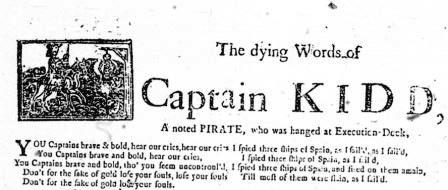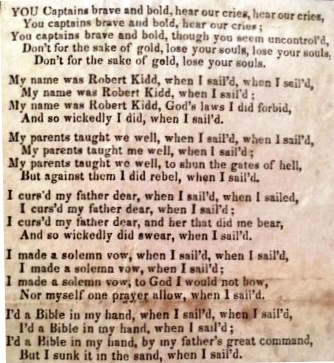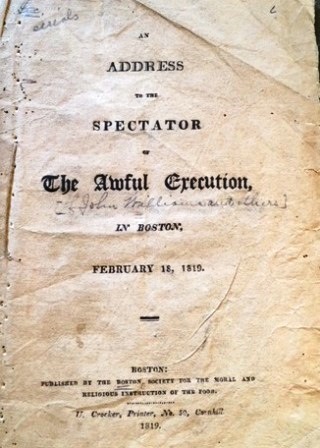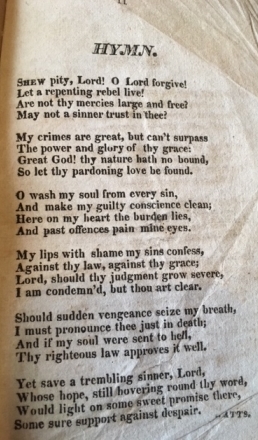By Ashley Williams, Reader Services
As many of us are gearing up to indulge in summer fun, potentially beach or ocean related, it seems a more than appropriate time to delve into MHS collections related to real life swashbucklers. In an earlier post we discussed collections related to the Whydah pirates who were executed in Boston in 1717. Boston also boasts as the place of capture for the notorious Capt. William Kidd.
Kidd started out as a British privateer and was praised for defeating several French ships for England. In 1695, he received a commission from the King to take out pirates that were attacking East India Trading Company Ships. It was after setting sail to fulfill this commission that Kidd turned to piracy.
The most extensive document we have related to Kidd’s story is titled A Full Account of the Proceedings in Relation to Capt. Kidd… written in 1701 by “A person of quality.”

Leading up to Kidd’s trial in 1701 there were many rumors and great debate that he was framed by his benefactors, primarily the Earl of Bellemont. The Earl had been responsible for proposing the pirate-hunting commission from the king and was also responsible for helping fit Kidd with a ship and crew. This pamphlet was published by allies of the Earl and primarily serves to argue for the Earl’s ignorance in relation to Kidd’s intentions of piracy, discuss the details of Kidd’s commission, and call for a salvaging of the Earl’s reputation while also recounting a sort of origin story for Kidd that follows up until his trial in England.
In addition, there are The Dying Words of Capt. Kidd and Capt. Kidd: a noted pirate, who was hanged at Execution Dock, in England. Both documents appear to have the same information, but are housed in different formats, accompanied by different art, and are marked with different publishing dates.

Capt. Kidd : a noted pirate, who was hanged at Execution Dock, in England, pictured above, is a small broadside adorned with a drawing of a ship set in the center of the title. It is believed to have been published sometime between 1837 and 1841, but the publisher is unknown. Running vertically up the center of the document, there is writing that indicates this piece was once sold, “by L. Deming at the sign of the Barber’s Pole, Hanover Street, Boston, and at Middlebury, Vt.”

The Dying Words of Capt. Kidd, however, is held as microform and is marked in the upper left-hand corner with an illustration of a figure on a horse looking onward towards another figure hanging from gallows. The publisher for this piece is also unknown and the publishing date an uncertain “1800?” Either way, they seem to simply be two separate printings of the same song.
Yes, you read correctly, song. Both titles turning out to be incredibly misleading, the text in these works appear not to be Kidd’s words at all, but a sort of foreboding nursery rhyme. The painfully repetitive lyrics recount a remorseful and repentant Kidd warning other sailors not to follow his example and, “for the sake of gold, lose your souls.”

Regretfully, no melody for the tune can be provided from the text, but if you’re looking for suggestions, I would recommend “She’ll Be Coming Round the Mountain.” Just give it a try.
It is difficult to imagine that Kidd actually felt or ever even said many of the lines recounted in this song himself, especially given that either of these were published a decent century after his execution. What isn’t difficult to imagine or observe is that religious leaders of the 17th and 18th century would often use pirate executions as an opportunity to draw the minds of their congregations to their own sins and need for repentance. This practice can be seen in action throughout several MHS collections, more notably by people like Cotton Mather who was also referenced in the earlier piratical blog post.
One example that can be given comes in a pamphlet from the Boston Society for the Moral and Religious Instruction of the Poor entitled An Address to the Spectator of the Awful Execution in Boston, referring to the execution of several pirates.

This brief pamphlet charges onlookers to pray for the pirates, reflect on their own sins, and to take initiative in dissuading their children and friends from sin. It ends with a hymn of repentance.

For more on pirates and guilt trips… I mean repentance:

